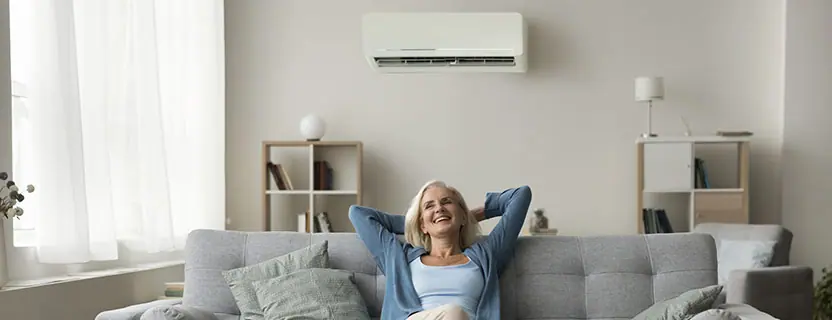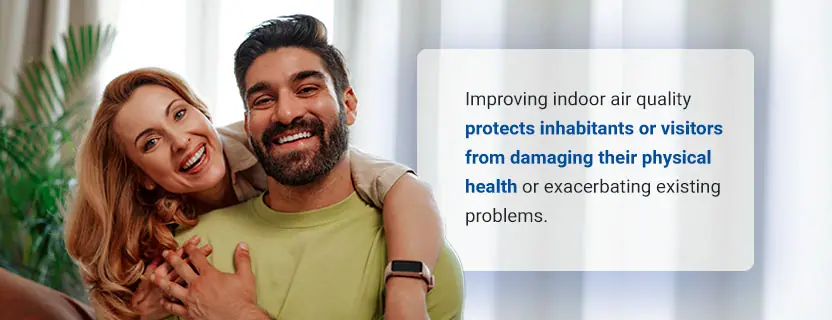
United States residents spend an average of 90% of their time indoors, making it essential to maintain safe interior conditions. While many people are aware of outdoor pollution, most do not know that you can also experience poor air quality inside commercial or residential spaces.
Various pollutants can spread within homes or commercial buildings, resulting in adverse health conditions. Enhancing the air quality helps you avoid the associated negative impacts. Learn more about the importance of improving indoor air quality and how Strada Services can help.
Indoor air quality is a measurement of air quality in and around buildings and how it impacts human health or comfort. Clean interior air is necessary for well-being — exposure to pollutants inside can result in immediate or long-term negative health effects. Different conditions and activities increase exposure to pollution and allow pollutants to enter the air.
For instance, these harmful contaminants can degrade indoor air quality:
Indoor air quality is important — it limits contaminant spread and improves living conditions. It’s critical to monitor contaminant levels and introduce preventive measures to keep air quality at healthy levels. Clean air facilitates physical and cognitive health, while various pollutants can result in lasting health damage.
Indoor air quality is also essential for the following factors.
Even minor exposure to contamination can cause immediate adverse reactions. Single encounters might result in symptoms like eye or nose irritation, fatigue or headaches. These symptoms vary depending on the pollutant type and the body’s specific reaction.
Certain groups might experience more severe symptoms after one encounter, such as those with preexisting medical conditions or young children. By prioritizing indoor air quality improvement, you can limit these negative symptoms.

Long-term effects from contaminants are another example of the importance of indoor air quality. Repeated encounters with indoor air pollutants can result in debilitating or even fatal diseases. You could contract respiratory diseases, cardiovascular problems or forms of cancer. Improving indoor air quality protects inhabitants or visitors from damaging their physical health or exacerbating existing problems.
In addition, regular exposure to contaminants can harm cognitive development or capabilities, which further displays the importance of indoor air quality. Many studies have linked contamination exposure to degraded verbal abilities and executive function. For instance, students attending a school with poor air quality display poorer performances on tests or activities. Similarly, employees in office buildings can focus or perform better with improved air quality.
Maintaining healthy indoor air quality is also essential for meeting the Environmental Protection Agency’s (EPA) standards for environmental justice. Environmental justice is the right for all people to experience and fight for environmental laws and regulations, regardless of race, socioeconomic status or other traits. Many studies prove that low-income, elderly and minority populations experience the detrimental impacts of poor air quality more acutely than other groups. Focusing on indoor air quality importance helps these groups achieve environmental justice.
Enhancing your property’s indoor air quality can help you avoid the dangers of poor air quality. These are three strategies for improving air quality in your home:
Depending on the contaminant type and severity, a certain strategy might work better than others. Heating, ventilating and air conditioning (HVAC) professionals can help you determine the best resolution for poor air quality. They can also assist with identifying pollutant sources.

Indoor air quality is important for safety and comfort. Different types of contaminants infiltrate homes and other spaces, degrading the air. Fortunately, you can enhance indoor air quality with various approaches.
If you want to enhance indoor air quality, choose Strada Air Conditioning & Heating today. We install and service various air filtration systems that can boost your home’s interior air conditions. From air filters to purification systems, our solutions filter out harmful pollutants and improve air quality. Our technicians have many years of experience and work diligently to identify and resolve your air quality concerns.
To learn more about our air quality services and the importance of good indoor air quality, schedule an appointment with Strada Services today.